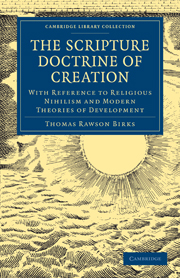 The Scripture Doctrine of Creation
The Scripture Doctrine of Creation Book contents
- Frontmatter
- Contents
- INTRODUCTION
- CHAPTER I ON RELIGIOUS NIHILISM
- CHAPTER II ON RELIGIOUS NIHILISM (continued)
- CHAPTER III THE ALLEGED LAW OF SCIENTIFIC PROGRESS
- CHAPTER IV THE BEGINNING
- CHAPTER V THE CREATION OF MATTER
- CHAPTER VI ON INFINITE SPACE
- CHAPTER VII ON FORCE, LAW, AND NECESSITY
- CHAPTER VIII ON CREATION AND LIFE
- CHAPTER IX ON CREATION AND EVOLUTION
- CHAPTER X EVOLUTION AS AN INDUCTIVE THEORY
- CHAPTER XI ON CREATION BY LAW
- CONCLUSION
CHAPTER VIII - ON CREATION AND LIFE
Published online by Cambridge University Press: 29 August 2010
- Frontmatter
- Contents
- INTRODUCTION
- CHAPTER I ON RELIGIOUS NIHILISM
- CHAPTER II ON RELIGIOUS NIHILISM (continued)
- CHAPTER III THE ALLEGED LAW OF SCIENTIFIC PROGRESS
- CHAPTER IV THE BEGINNING
- CHAPTER V THE CREATION OF MATTER
- CHAPTER VI ON INFINITE SPACE
- CHAPTER VII ON FORCE, LAW, AND NECESSITY
- CHAPTER VIII ON CREATION AND LIFE
- CHAPTER IX ON CREATION AND EVOLUTION
- CHAPTER X EVOLUTION AS AN INDUCTIVE THEORY
- CHAPTER XI ON CREATION BY LAW
- CONCLUSION
Summary
Life, in all its countless forms, is far more complex, mysterious, and wonderful, than lifeless matter. We look upon the world around us, and see on every side an immense variety of living things, gifted with certain powers of growth, assimilation, reproduction, and, in the animal world, of spontaneous motion, which create an irresistible impression of something that lives and grows or moves, and is a contrast to the inanimate substances which form the rest of the visible and sensible universe. The more we study them, the plainer are the marks in each of some plan or design, adapting each to fulfil some especial mode of being. No piece of human mechanism contains adjustments so various and manifold, so adapted to secure their special objects, as those which can be traced in the structure of plants, and still more in the senses and limbs of animals, growing more complex and various as we rise higher in the scale, till they reach their height in the senses and faculties of living men. And thus the first and simplest induction of science, derived from observation, direct or indirect, of thousands of millions of human beings, and millions of millions, perhaps even trillions, of plants and animals, of a thousand different kinds, is that the world has a Creator and Lord, whose power is great, and His wisdom infinite; and that, as far as the light of the sun surpasses the feeblest taper, so far does His Divine wisdom, who planted the ear and formed the eye, and formed all these countless creatures, gifting them with a life so wonderful, outpass the highest attainments of human.
- Type
- Chapter
- Information
- The Scripture Doctrine of CreationWith Reference to Religious Nihilism and Modern Theories of Development, pp. 175 - 187Publisher: Cambridge University PressPrint publication year: 2009First published in: 1872
